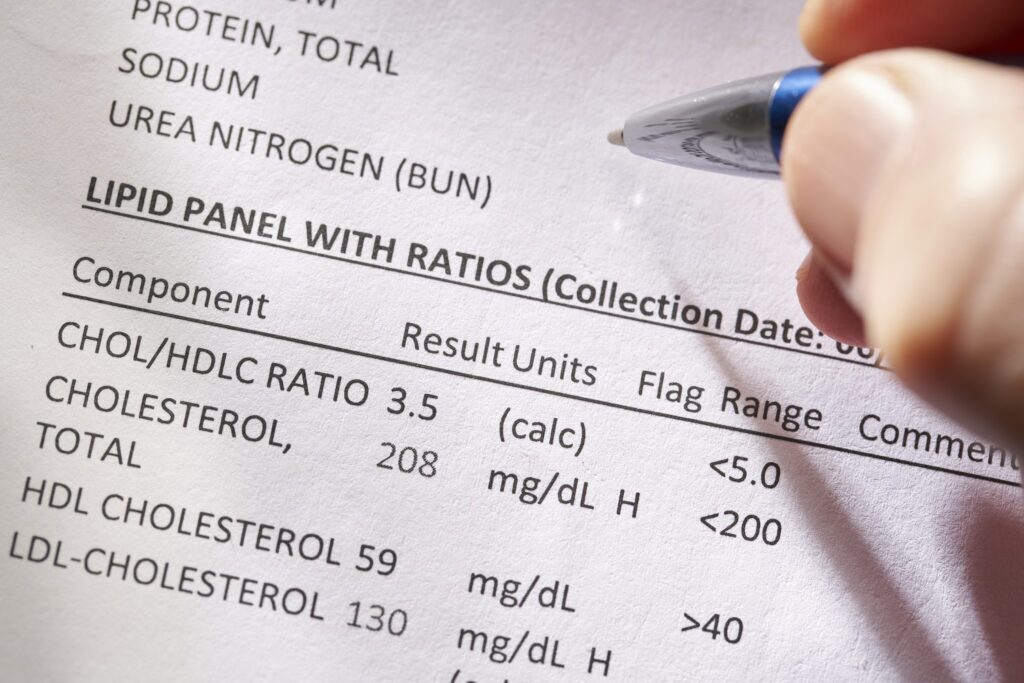Medical Review by Jennie Stanford, MD, FAAFP, DipABOM
Summary:
- Regular cholesterol testing helps identify risks of heart disease and stroke. This can help you take proactive steps in managing your diet, lifestyle, and medications based on your cholesterol levels.
- Cholesterol is usually measured with a test called a lipid profile. This shows total cholesterol levels, as well as LDL (“bad” cholesterol) and HDL (“good” cholesterol). It will also show your levels of triglycerides (a type of fat that can cause health problems when too much is in the bloodstream).
- After reviewing the results of your lipid profile, your healthcare provider may offer risk assessments, lifestyle recommendations for diet and exercise, medications like statins if clinically indicated, and regular follow-up and monitoring.
Testing your cholesterol levels can help you stay healthy
Understanding your cholesterol levels allows you to take proactive steps in managing your diet, lifestyle, and medications to improve your cardiovascular health.
Regular cholesterol testing can help identify your risk of heart disease and stroke—two leading causes of death in the United States. Below, you’ll find information from Lemonaid Health on what these tests measure and how to interpret their results with your healthcare provider.
Different cholesterol levels & how to interpret them
Cholesterol levels are measured in milligrams (mg) of cholesterol per deciliter (dL) of blood. These results are usually displayed in a lipid profile, which also contains information about your triglyceride levels (triglycerides are a type of fat that circulate in your blood and can cause health problems in high amounts).
When you receive your cholesterol test results, you will see several numbers that indicate the levels of different types of cholesterol and triglycerides in your blood. Here’s what each cholesterol level represents, plus a chart to help you understand typical benchmarks for them.
Total cholesterol
Total cholesterol is the sum of all types of cholesterol in your blood. A high total cholesterol level increases your risk for heart disease and stroke.
LDL cholesterol (Low-Density Lipoprotein)
LDL cholesterol is often referred to as “bad” cholesterol because high levels can lead to plaque buildup in your arteries. High LDL increases your risk for heart disease and stroke.
HDL cholesterol (High-Density Lipoprotein)
HDL cholesterol is known as “good” cholesterol because it helps remove other forms of cholesterol from your bloodstream. This process is called reverse cholesterol transport.
Comparison chart for cholesterol levels
Information from StatPearls at the National Library of Medicine.
| Total Cholesterol (mg/dL) | LDL Cholesterol (mg/dL) | HDL Cholesterol (mg/dL) | |
| Optimal | Less than 200 | Less than 100 | 60 and above (Best) |
| Near Optimal | 200-239 | 100-129 | 50-59 (Better) |
| Borderline High | 240-279 | 130-159 | 40-49 (Average) |
| High | 280 and above | 160-189 | Less than 40 (Poor) |
| Very High | – | 190 and above | – |
What to expect from your healthcare provider
After reviewing the results of your lipid profile with you, a healthcare provider may recommend any of the following:
A risk assessment
This can provide estimates about your risk of heart disease and stroke based on your cholesterol levels and other factors such as age, family history, smoking status, blood pressure, and presence of diabetes. This assessment might also involve calculating your 10-year risk of cardiovascular disease using tools like the Framingham Risk Score.
Lifestyle recommendations
Depending on your results, the provider may suggest lifestyle changes to help improve your cholesterol levels and reduce cardiovascular risk. This could include:
- Eating more fruits, vegetables, and whole grains.
- Reducing intake of saturated fats and trans fats.
- Regular exercise to maintain a healthy weight and improve cholesterol levels.
Medication
If lifestyle modifications are not sufficient to bring your cholesterol levels into a healthy range, or if your cardiovascular risk is high, your provider may prescribe cholesterol-lowering medications.
Statins are commonly prescribed medications for managing cholesterol levels.
Follow-up & monitoring
Your healthcare provider will most likely suggest a schedule for follow-up visits to monitor your cholesterol levels and assess the effectiveness of your treatment plan.
Regular monitoring is crucial, especially if you are on medications, to help your cholesterol levels move toward the desired range and to adjust treatment as necessary.
Education & support
Finally, your provider may offer additional resources for education and support, such as:
- Referral to a dietitian.
- Information about local or online support groups.
- Educational materials that can help you understand and manage your cholesterol levels effectively.
Controlling your cholesterol with Lemonaid Health
Lemonaid Health can provide online assessments and consultations with US-based health practitioners to help you manage your cholesterol levels, as well as deliveries of medication when clinically indicated. Use what you’ve learned here to make informed decisions about your cholesterol and improve your health.
Learn more: Understanding cholesterol: the good, bad, & what you need to know
Frequently asked questions about cholesterol levels
How often should I have my cholesterol levels tested?
Typically, adults over 20 should test their cholesterol once every 4-6 years during a heart risk assessment unless more frequent testing is recommended by a qualified healthcare provider.
What are the risk factors for high blood cholesterol levels?
Risk factors for high blood cholesterol include:
- Eating foods with high levels of saturated or trans fats
- Not getting enough physical activity
- Smoking or drinking too much alcohol
- Stress
- Not enough sleep or low-quality sleep
What are the risk factors for high blood cholesterol levels?
High cholesterol doesn’t normally come with visible symptoms—which is why it’s sometimes referred to as a “silent” condition. However, the long-term consequences of high total or LDL cholesterol can have serious negative health effects, so testing is an important part of maintaining good cardiovascular health.












